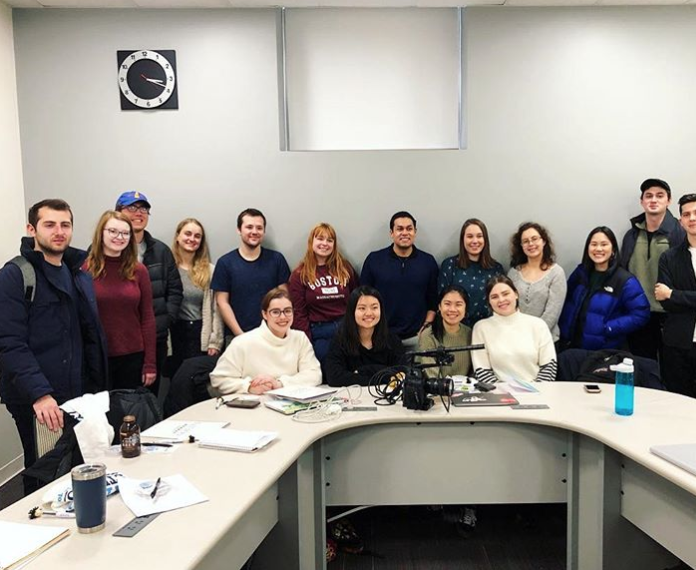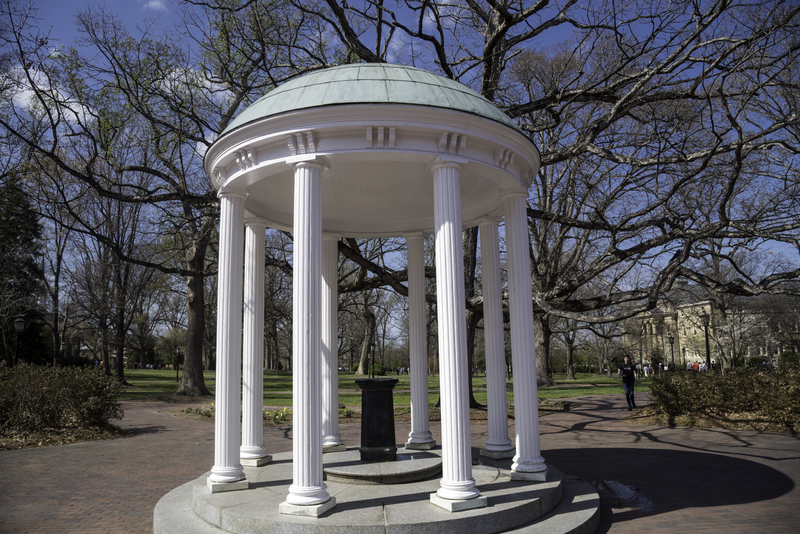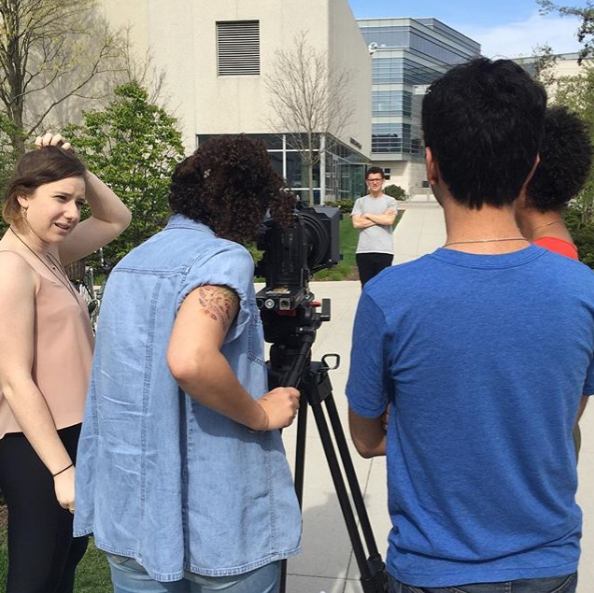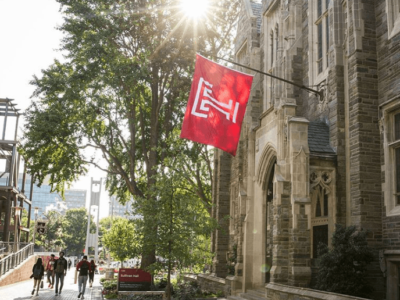Breaking news means breaking out your phone. You’re on the pulse of the story. You want to know how major corporations are responding. And you need to prepare a statement for your client to release. Communications professionals know how to deliver information under pressure. Essential to today’s day and age, communications majors learn how to speak effectively across through print, digital, radio and television. These 10 universities shine when it comes to delivering the most robust communication programs to their students. From extracurricular activities and alumni networks to one-of-a-kind research opportunities, these 10 best schools for communications majors offer the full package.
[woobox offer=’tuafxp’]
Read on to find out 2019’s 10 best Communication schools in the nation.
10. University of Wisconsin-Madison

The Communications Department at the University of Wisconsin-Madison teaches 4,000 students school wide in classes every semester, with around 600 undergrads and 80 graduate students within the department. The huge interest in communication gives UW-Madison the space to offer classes that cater to other majors too. Offering two different tracks for undergraduates, graduates can branch into four different areas: communication science, film, media and cultural studies and rhetoric, politics and culture. Along with academics, you have the difficult task of choosing between 24 different student organizations, not including the three department-affiliated ones. For instance, the Hollywood Badgers host networking meetups, alumni panels and special events, including a senior send off for graduates hitting the entertainment industry of L.A. or the Big Apple. Furthermore, the Badger Podcast Network teaches students how to create high-quality podcasts. Through the university’s International Academic Programs, a search engine for study abroad programs and internships, students can choose between internships for credit from Buenos Aires to Brussels. Talk about one of the best communication schools with a huge network.
9. Boston University

Boston University communication students don’t sweat finding a job post-graduation because they feel beyond prepared. Approximately 95 percent of undergraduates found jobs within six months at companies like HarperCollins Publishers and the Ellen Degeneres Show. With two bachelor degrees in communications and media science, graduate students then choose from four different masters degrees. Focusing a little on all areas of communications, media sciences provides students with a more comprehensive degree set. The variety of options exceed the classroom as well. For example, the Los Angeles Internship Program gives students a hands-on experience while the professors serve as mentors in and out of the classroom. BU also offers the London Internship Program, along with several other programs within the country and abroad. On campus, students can access seven different student organizations, like the COM Student Assembly and eight different media groups, like the student-run multimedia website, the COMmunicator. At the COMmunicator in particular, students can contribute to the page for two credits per semester. Even after graduation, Boston University’s College of Communication offers workshops to continue learning and training. One of the best communication schools, the journey continues from the moment you start to the moment you graduate.
8. University of Texas at Austin
The power of the University of Texas at Austin lies in the strength and support of its alumni network, like NFL Content Chief Jordan Levin and Pulitzer Prize Winner William McKenzie. “Longhorns love to be surrounded by other Longhorns, so using the alumni network can usually result in getting hired,” University of Texas senior Eric Goodman said. Alumni never shy from offering students internships or putting in a good word. This not only eases your stress upon graduation, but also drives you to succeed. “I don’t know if there is a more motivating experience than getting to work for Emmy-winning alumni while you take classes at the same school that launched their careers,” Goodman said. Academically, University of Texas at Austin’s Moody College of Communication gives students the option to choose between corporate communication, interpersonal communication and political communication at the undergraduate level. Students can then choose between interpersonal communication, organizational communication and technology and rhetoric and language at the graduate level. Aside from school, students can use the Moody College of Communications Career Services Center or the Vick Center of Strategic Advising and Career Counseling as resources to landing an internship at places like People Magazine and Late Night with Conan O’Brien. With such an alumni backing and network at one of the best communication schools, get ready to become a force to be reckoned with.
7. University of Illinois at Urbana Champaign

University of Illinois at Urbana Champaign’s Department of Communication provides students with extensive resources and opportunities to succeed after graduation. For instance, all graduates receive guidance in growing comfortable within the department, the university and the community from the Communication Graduate Student Association. Additionally, students stay informed on the latest happenings both inside the department and out in the world through newsletters. With both teaching and career internships, students get the option to earn credit in either an academic or work setting. Alumni events such as the Illinois Tradition Awards help foster a sense of pride and achievement in graduates and undergraduates showcasing leadership and academic excellence. “In Chicago, JD Miller hosted a networking event for everyone in the Communications Department and alumni to attend,” senior Delayne Weston said. “Given an opportunity to…make connections in a social setting brought me a sense of pride.” Throw out your fears of entering the work field after college. Around 95 percent of students gain employment at companies such as Northern Trust, if they choose not to continue education. With an average starting salary of $43,000, expect high prospects of a comfortable living. Communication students choose from six different areas of study: communications and culture, mediated communications and technology, communication and health, rhetoric and public disclosure, interpersonal communication and communication and organizations. Each year, over 900 students seek offered B.A., M.A., M.S., and Ph.D. degrees. “The Department of Communication really fostered my love of data analysis and quantitative methods,” fourth-year student Hannah Overbye said. “We have absolutely excellent quantitative scholars here.”
6. University of Pennsylvania
Okay, are you ready to have your mind blown by the University of Pennsylvania’s Annenberg School for Communication? It all lies in this one program detail: all doctoral students at the Annenberg School are fully funded for up to five years and receive annual travel and research funds. Now that’s a deal. And with 12 different research centers and programs, you will most definitely get your money’s worth with their collegiate reach and interesting takes on communication. Ever thought of combining neuroscience with communications? Get involved at Communication Neuroscience Lab. The Annenberg School lets students take their degree in the direction that they want to go with certificates in African Studies and teaching plus focuses in anything from contemporary culture to economic contexts to media institutions. Plus UPenn Annenberg School encourages you to pair their degree set with courses offered at other colleges within the university.
5. University of North Carolina at Chapel Hill

The University of North Carolina’s Department of Communication graduates take flight in the communication field after graduation. Ph.D. candidate Ashley Mattheis, for example, lectured at King’s College London. “The wealth of knowledge I have gained from these courses is invaluable to me and I will apply it in both my personal and professional life,” University of North Carolina senior Nicole Saca said. Undergraduates choose between Interpersonal & Organizational Communication, Media & Technology Studies, and Production and Rhetorical Studies—or they can create their own specialized track. The department knows that social and historical obstacles stop the world from achieving diversity on all fronts, so they seek to grow and involve underrepresented communities. This gives students an inclusive environment and opens up insight to learn about differences which in turn affects communication. And the department makes sure students have every opportunity to gain experience during their undergrad. COMM 393 allows students to explore different internships at companies like The Full Bird and Fund for Peace. UNC also has a Lambda Pi Eta chapter, an official honor society of the National Communication Association. “Through that organization, I am able to connect with other communication majors and hold events that strengthen our Carolina community,” President of Lambda Pi Eta Saca said.
4. Northwestern University

Northwestern’s School of Communication offers two doctorate degrees, two master’s degrees, plus six bachelor’s degrees and two dual degrees. Communications continues to grow and change, so this provides students with opportunity to explore different areas of the field and specializing. Branching out from the traditional media focus of general communications programs, the degrees tap into engineering, music and health to name a few. Through Communications Sciences and Disorders, a unique PhD. program, you can research speech pathology and learning disabilities. Adding to traditional education, the school goes beyond by adding theaters, centers, co-curriculars and clinics to your educational opportunities. Focusing on technology that supports communication and development over one’s lifespan, the Inclusive Technology Lab designs and evaluates prototypes and engages in field studies. Taking a different approach to the major, The Network for Nonprofit and Social Impact delves into the collaborative process and how it impacts creating change within the community. Outside of class, communications students get involved with the eight student organizations and activities that give a taste of actual work. The National Student Speech Language Hearing Association has member representation in the American Speech-Language-Hearing Association. And speaking of actual work, the school of communication has the Office of External Programs, Internships and Career Services (EPICS), which connects students to the alumni network and resources to careers and internships. With Northwestern, you can take your communications degree to levels unimagined.
3. Stanford University

Stanford’s Department of Communication prides itself at riding the wave of cutting edge technology and new innovations. One example: The department has the largest virtual reality lab that explores levels of immersion, gauges empathy levels and examines racism, among other projects. Because of its ideal spot in the Bay Area and Palo Alto, classes emphasize and focus on newer forms of media to give students the know-how for graduation. Where do you think the concept of live-streaming the editorial process or interactive news apps came from? “I can’t emphasize enough how exceptional our faculty is. They always have open doors to any students, regardless of whether or not they are enrolled in that professor’s course,” Stanford senior Walker Brown said. Many schools pride themselves on diversity, but the department of Communication truly lives it. Just take a look into what one class may look like. “A group of football players and other athletes were sitting on my left, in front of me was a full-time student who was also a series regular on a horror-comedy on FX, and on my right was a peer-turned-friend who is now working on expanding her family’s business into different markets in India,” Brown said. Variety awaits in the education and in environment in Stanford’s department of communication.
2. American University
American University lets communication majors zero in on their niche at the undergraduate level. Communications majors can take one of two tracks: foreign language and communication media. With an expert faculty of over 30 full-time professors and lecturers, expect an education of a lifetime. Just imagine getting taught by a former juror for the Sundance Film Festival or a former play-by-play announcer for NCAA Track and Field West Preliminaries. At American University, you won’t just imagine your communication dreams; you’ll live them. “They challenge you to think critically and competently about cultural, social, and political issues related to media and technology,” said American University graduate student Donte Newman. The school has six different academic and research centers, such as Current, a non-profit news organization reporting about media in the U.S. Outside the classroom, students have different options for internship credit at the undergraduate level and can study abroad at three centers in Belgium, Kenya and Spain. Not interested in those places? Don’t worry. The school partners with myriad programs at ten other countries including Japan and the Czech Republic.
1. University of Southern California
The USC Annenberg School for Communications and Journalism helps students land internships at giant like 20th Century Fox as early as their sophomore year. With an incredible career development program, alumni help students get their foot in the door of communications. Following a bachelor’s degree in Communications, the college offers four different masters degrees along with a doctorate degree. The school offers masters programs for public diplomacy and digital social media plus minors. This different tracks allow students to find the perfect degree for their career goals, whether that be social media manager extraordinaire or corporate communications director at Fortune 500 companies. The Annenberg Communications school has 18 different centers and programs for student research, looking into hot topics like inequality in the entertainment industry. On top of that, the school publishes an online journal, The Annenberg Press. Students not only have free access to top notch scholarly papers, they also get the opportunity to peer review, edit, submit and publish their own scholarly papers. Then students can take that master of communications to international study abroad programs in places like Hong Kong and Rome. But fun happens on campus, as well, with the fifteen different student organizations to join. Very hands on, you can join Trisight Communications, a non-profit, student run firm that provides small business with strategic communications services. You also have the Southern California Communication Association, which provides students with workshops and a platform to share their work in an empowering environment. The Annenberg Communications makes sure to cover every possible route that leads a communication major to success.
[woobox offer=’tor6do’]



















